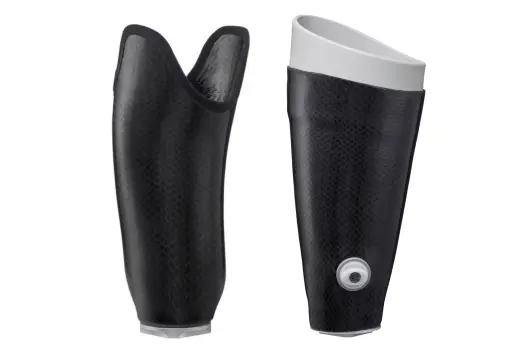Home > Products > Prosthetics > Sockets
Sockets
Sockets are the component that the prosthetic attaches to so the patient can fit it onto their body.

Prosthetic Sockets: The Foundation of a Comfortable, Functional Fit
What Is a Prosthetic Socket?
The prosthetic socket is the most critical part of any prosthetic limb—it’s the custom-made interface that connects your residual limb to the rest of your prosthesis. A well-designed socket ensures proper weight distribution, secure suspension, and all-day comfort, allowing you to move confidently and without pain.
At Advanced Prosthetics, we specialize in creating customized prosthetic sockets that match your unique anatomy, activity level, and lifestyle. A precise fit not only helps prevent skin irritation and pressure sores but also improves the overall performance and control of your prosthesis.
Why the Socket Matters
Even the most advanced prosthetic knee, foot, or hand won’t function properly without a well-fitting socket. The socket is the foundation—it determines how well your limb integrates with the prosthetic system. A good socket:
- Provides comfort and support during daily activities
- Prevents unwanted movement or rotation of the prosthesis
- Distributes pressure evenly to protect sensitive areas
- Enhances control, stability, and confidence while walking or performing tasks
If your socket doesn’t fit properly, it can lead to discomfort, poor mobility, and even injury. That’s why ongoing adjustments and expert follow-up care are essential.
Types of Prosthetic Sockets
At Advanced Prosthetics, we design and fit various types of sockets based on your needs, level of amputation, and lifestyle:
1. Patellar Tendon-Bearing (PTB) Sockets
Commonly used for below-knee (transtibial) amputees, PTB sockets apply pressure on the patellar tendon while relieving pressure on sensitive areas like the tibia and fibula.
2. Ischial Containment Sockets
Designed for above-knee (transfemoral) amputees, these sockets enclose the ischial bone to improve control and alignment during walking.
3. Subischial Sockets
A lower-profile alternative to ischial containment, subischial sockets provide greater comfort and range of motion, particularly for active users.
4. Hybrid and Custom Designs
We also offer advanced socket systems that incorporate flexible inner liners, adjustable panels, and vacuum or suction suspension for an even more customized fit.
Suspension Systems: Keeping Your Socket Secure
In addition to socket design, the suspension system plays a vital role in comfort and stability. Suspension methods include:
- Suction suspension: Uses a one-way valve to create a vacuum seal
- Vacuum-assisted suspension: Actively pulls air out for a more secure fit
- Pin-lock systems: Use a locking liner with a mechanical pin for easy attachment
- Anatomical suspension: Uses the natural shape of the limb to hold the socket in place
Our team at Advanced Prosthetics will help you select the best suspension system based on your comfort preferences, limb shape, and activity goals.
The Fitting Process at Advanced Prosthetics
Creating a prosthetic socket is both a science and an art. At Advanced Prosthetics, we use advanced scanning technology, precision molding, and years of clinical experience to ensure a perfect fit. Our fitting process includes:
- Detailed Limb Assessment
We examine limb shape, skin condition, pressure tolerance, and range of motion. - Custom Socket Fabrication
Using digital imaging and/or traditional casting, we create a custom-molded socket designed just for you. - Test Sockets & Adjustments
You’ll receive a clear or temporary socket for trial wear, during which we make fine adjustments for optimal comfort and performance. - Final Socket Delivery
Once the fit is perfected, your final socket is fabricated using durable, lightweight materials and integrated into your prosthetic limb.
Signs You May Need a Socket Adjustment or Replacement
Even the best-fitting socket may need updates over time due to body changes, activity levels, or wear and tear. Watch for signs like:
- Skin irritation or pressure sores
- Looseness or instability in the socket
- Difficulty donning/doffing the prosthesis
- Pain during or after use
At Advanced Prosthetics, we provide ongoing care to keep your socket—and your mobility—in top shape.
Schedule a Fitting or Consultation Today
If your current prosthetic socket isn't comfortable, or you're ready to be fit for a new device, our expert prosthetists at Advanced Prosthetics are here to help. Your mobility and comfort matter to us, and it all starts with the right socket.
Contact us today to schedule a consultation and experience the Advanced Prosthetics difference.
